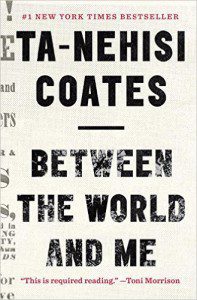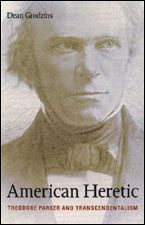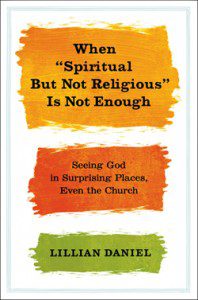The Rev. Dr. Martin Luther King, Jr. was only thirty-nine years old when he was murdered. If King were alive today, he would be celebrating his eighty-seventh birthday. His prophetic activism for peace and justice ended tragically early.
Looking back, less than five years passed from King’s famous “I Have a Dream” speech in 1963 to his assassination in 1968. Exactly one year to the day before he was killed, he preached a powerful and controversial sermon from the pulpit of Riverside Church in New York City titled “Beyond Vietnam: A Time to Break Silence.” And in the next year—that turned out to be the final one of his short life—he was organizing a “Poor People’s Campaign.” But neither that 1967 sermon against the War in Vietnam, nor his 1968 campaign for an “Economic and Social Bill of Rights” came out of nowhere. In many ways, the 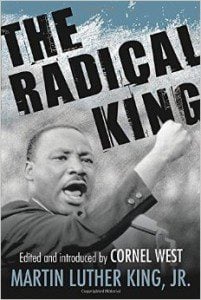 “Radical King” had been there for years (v). And if you are interested in going deeper, there is an excellent new collection of King’s speeches from Beacon Press titled The Radical King that is edited and introduced by Dr. Cornel West.
“Radical King” had been there for years (v). And if you are interested in going deeper, there is an excellent new collection of King’s speeches from Beacon Press titled The Radical King that is edited and introduced by Dr. Cornel West.
Significantly, radical doesn’t just mean extreme; it also has the connotation of getting to the root. King had long understood that racism is a symptom of deeper systemic problems — and that racial injustice is inextricably linked with materialism (economic injustice) and militarism (the misuse of blood and treasure—that should be used to support the common good—to instead support the Military Industrial Complex). He called racism, materialism, and militarism the “triple threats” to building the beloved community (91).
Relatedly, the context for King’s “I Have a Dream Speech” is often referred to as the “March on Washington.” But the full name, the “March on Washington for Jobs and Freedom,” is one of many signs that King had long been concerned with what he called the “inseparable twins” of racial and economic injustice (39). And in that 1967 sermon at Riverside Church, King spoke directly about how the funds for President Johnson’s War on Poverty had been diverted to War in Vietnam. In King’s words,
“I knew that America would never invest the necessary funds or energies in rehabilitation of its poor so long as adventures like Vietnam continued to draw men and skills and money like some demoniacal destructive suction tube. So I was increasingly compelled to see the war as an enemy of the poor and to attack it as such.” (103)
We have seen similar patterns of misappropriated resources and war profiteering repeated in recent years. Consider how much could have been accomplished if all the trillions of taxpayer dollars — not to mention lives, time, and energy — spent in the Iraq and Afghanistan Wars had instead been used on rebuilding infrastructure, improving education, and funding social program here at home (204).
Again, however, despite this new boldness at the end of King’s life, in many ways, “The Radical King” had been there for years. Dr. King’s courageous condemnation of the War in Vietnam emerged, among many influences, out of his training as a minister in the black prophetic tradition. Many of you will recall parallels to another sermon from the black prophetic tradition that drew controversy during President Obama’s first presidential campaign in 2008. After rehearsing a litany of American ethical failures from Japanese-American internment camps, to a history of racism, to all the civilians who have been killed as “collateral damage” by U.S. weapons, The Rev. Jeremiah Wright (President Obama’s former pastor at Trinity United Church of Christ in Chicago) said that we should sing not only “God Bless America,” but instead sometimes say, “God damn America…for killing innocent people…for treating our citizens as less than human.” Needless to say, that clip, taken out of its historical context, did not play well on Fox News.
I bring up that incident because on Thursday, April 4, 1968 — the same day in which Dr. King was later assassinated — he called Ebenezer Baptist Church in Atlanta, where he served as pastor, to say that the title for his Sunday sermon would be “Why America May Go to Hell” (ix). He was killed before he could preach that sermon. But as King had said in a speech less than two months earlier, “America, too, is going to hell if she doesn’t use her wealth. If American does not use her vast resources of wealth to end poverty and make it possible for all of God’s children to have the basic necessities of life, she, too, will go to hell” (248). In both cases, with both King and Wright, those strong words of dissent were spoken neither out of a hatred for America nor a disrespect the troops, but rather from a patriotic love that longs for America (including its military) to live up to its highest ideals, and to once again be known around the world not as a purveyor of “violence” but as an example of “revolution, freedom, and democracy” (211).
In this spirit of recognizing the “Radical King,” who sought to get to the root of the problem of systemic injustice, it is also vital to name that Dr. King’s “dream” is about so much more than electing our nation’s first black president. King’s dream of a Beloved Community is about organizing our society to recognize what my own tradition of Unitarian Universalism calls our First Principle, “The inherent worth and dignity of every person” — ultimately extending out to our Sixth Principle: “The goal of world community with peace, liberty, and justice for all.”
And at a time of increasing wealth inequality, when the word socialism is being resurrected, it’s significant to note that in 1966, when wealth inequality was much less extreme than it is today, Dr. King nevertheless said, “There must be a better distribution of wealth and maybe America must move toward a democratic socialism” (ix). Dr. King had first read Marx’s Das Kapital and The Communist Manifesto in 1949 — almost two decades before his death — during his break over the Christmas holidays (41). In reflecting on those books, King wrote:
Marx had revealed the danger of profit motive as the sole basis of an economic system: capitalism is always in danger of inspiring men to be more concerned about making a living than making a life. We are prone to judge success by the index of our salaries or the size of our automobiles, rather than by the quality of our service and relationship to humanity…. Insofar as Marx posited a metaphysical materialism, an ethical relativism, and a strangulating totalitarianism, I responded with an unambiguous “no”; but insofar as he pointed to weaknesses of traditional capitalism, contributed to the growth of a definite self-consciousness in the masses, and challenged the social conscience of the Christian churches, I responded with a definite “yes.” (43)
That’s similar to what I’ve posted about previously as an “Organic Marxism” for the twenty-first century: the need for a new “New Deal.”
And speaking of what it would look like to continue to turn King’s Dream into deeds, just this past March we celebrated the fiftieth anniversary of the Selma-to-Montgomery Marches. And when I think about the people carrying on King’s legacy today, one of the first names that comes to mind is The Rev. Dr. William Barber, leader of the Moral Mondays movement in North Carolina against voting rights restrictions.
Looking back two years earlier to 2013, when we celebrated the fiftieth anniversary of the March on Washington for Jobs and Freedom, Barber’s activism helped catalyze years of grassroots organizing to ensure that date was not merely about remembering the past: “Throughout the hot, wet summer of 2013, tens of thousands of people came for thirteen consecutive Moral Mondays. By the end of the legislative session, nearly a thousand people had been arrested in the largest wave of mass civil disobedience since the lunch counter sit-ins of 1960” (Barber x-xi).
Barber is convinced that we are in the midst of what could potentially be — what needs to be— a “Third Reconstruction” in our nation’s history. As some of you may recall from my election post back in November, there was a paradigm shift in our Constitutional framework in the wake of the Civil War:
The Thirteenth Amendment [of 1865] abolished slavery. The Fourteenth Amendment [of 1868] nationalized citizenship and made the federal government into the guarantor of American rights. And the Fifteenth Amendment [of 1870] gave all men the right to vote…. The total effect was…a revolution of national purposes and constitutional design — not simply a restoration of the Founders’ Union. (103)
Those changes were all a part of our First Reconstruction following the Civil War. However, even though President Lincoln’s 1863 Emancipation Proclamation freed the enslaved members of our country, a White Supremacist response led to racist lynch mobs and the founding of the KKK five years later in 1868. Moreover, to keep the now-freed people of color segregated, the White Supremacist backlash to the First Reconstruction was codified into Jim Crow laws, culminating in the 1896 Supreme Court case, Plessy v. Ferguson, which ruled “separate but equal” to be Constitutional.
After a century of segregation, the Civil Rights Movement led to a Second Reconstruction that started with 1954’s “Brown v. Board of Education” (which overturned Plessy v. Ferguson and ruled segregation in public education unconstitutional) and culminated in the Civil Rights Act of 1964 and the Voting Rights Act of 1965 (118-119).
Just as there was a White Supremacist backlash to the First Reconstruction (lynch mobs, the KKK, and segregation), there was also a White Supremacist reaction to the Second Reconstruction of the Civil Rights Movement. Over the past fifty years since the end of the Second Reconstruction, systemic racism has become less blatant, but increasingly insidious. And it will take nothing less than a Third Reconstruction to dismantle what has been called The New Jim Crow: Mass Incarceration in an Age of Colorblindness, a racially biased enforcement of our criminal justice system (xii – xiii). If you have not read The New Jim Crow by Michelle Alexander, I can’t recommend it highly enough.
For now, I’ll give just a few highlights about the New Jim Crow that show the need for a Third Reconstruction to live more fully into the promise of the American experiment. Consider, for example, that even though there are “nearly identical rates of illegal drug use among whites and blacks, only a single percentage point between them,” there is a much higher percentage of blacks prosecuted for drug use (264). “In some states, black men have been admitted to prison on drug charges at rates twenty to fifty times greater than those of white men” (7). As a result of this racial bias, “No other country in the world imprisons so many of its racial or ethnic minorities. The United States imprisons a larger percentage of its black population than South Africa did at the height of apartheid” (6). In this light, calling for a Third Reconstruction to make systemic changes is not hyperbolic: “Today there are more African-American adults under correctional control — in prison or jail, on probation or parole — than were enslaved in 1850, a decade before the Civil War began.”
Perversely, this biased use of the criminal justice system to insidiously enforce a New Jim Crow exploits a loophole in the 13th Amendment (which was part of the First Reconstruction). The 13th Amendment made slavery and involuntary servitude unconstitutional “except as a punishment for crime whereof the party shall have been duly convicted” (72). And as Michele Alexander’s book details,
Once you’re labeled a felon, the old forms of discrimination — employment discrimination, housing discrimination, denial of the right to vote, denial of educational opportunity, denial of food stamps and other public benefits, and exclusion from jury service — are suddenly legal. As a criminal, you have scarcely more rights, and arguably less respect, than a black man living in Alabama at the height of Jim Crow. We have not ended racial caste in America; we have merely redesigned it. (2)
This racist history is why it is important to build a movement not around #AllLivesMatter (although all lives certainly do matter), but around advocating, in particular, that #BlackLivesMatter — because black lives are the ones that have most often not mattered in our country’s history. And in seeking to carry on King’s legacy in 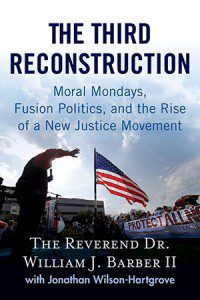 this age of needing a Third Reconstruction, Rev. Barber calls for a focus on protecting Voting Rights (a centerpiece of the Second Reconstruction), which have been eroding in recent years (58, 125). (For more, see Barber’s book The Third Reconstruction: Moral Mondays, Fusion Politics, and the Rise of a New Justice Movement.)
this age of needing a Third Reconstruction, Rev. Barber calls for a focus on protecting Voting Rights (a centerpiece of the Second Reconstruction), which have been eroding in recent years (58, 125). (For more, see Barber’s book The Third Reconstruction: Moral Mondays, Fusion Politics, and the Rise of a New Justice Movement.)
Accordingly, I was heartened to hear President Obama pick up on this theme in his final State of the Union address to counteract the baseless fear-mongering around non-existent “Voter Fraud,” which is a cynical attempt to suppress voter turnout among racial minorities and people who are poor. In the president’s words: “We’ve got to make it easier to vote, not harder. We need to modernize it for the way we live now. This is America: We want to make it easier for people to participate.” President Obama continued by name checking Dr. King explicitly: “Our brand of democracy is hard. But…[we are] inspired by those voices of fairness and vision, of grit and good humor and kindness…. Voices Dr. King believed would have the final word—voices of unarmed truth and unconditional love.”
For now, I’ll conclude with a quote from Chris Crass (a racial justice activist from mu own Unitarian Universalist tradition), who has been especially inspiring to me recently in seeking to model a way of carrying on the work of Dr. King today. For now, I’ll share with you just one passage from Crass’s book, Towards the “Other America”: Anti-Racist Resources for White People Taking Action for Black Lives Matter:
To become an anti-racist faith community, the key question, for a white / white majority community, is not, “How do we get people of color to join our faith community?” It is, “How can we make a prolonged, spirituality-rooted, engaged commitment to uprooting white supremacy within our community and take ongoing collective action to challenge it in society?
Our goal is not to have white people sit alongside a person of color so as to affirm that those white people aren’t racist. Our goal is to build and be part of a beloved community united to end structural oppression and unleash collective liberation in our congregations….schools, neighborhoods, workplaces, and throughout society….
My goal isn’t to be a great ally. My goal is the abolition of white supremacist capitalist patriarchy and the building up of a multiracial democracy with economic, gender and racial justice for all… (171-172).
The Rev. Dr. Carl Gregg is a trained spiritual director, a D.Min. graduate of San Francisco Theological Seminary, and the minister of the Unitarian Universalist Congregation of Frederick, Maryland. Follow him on Facebook (facebook.com/carlgregg) and Twitter (@carlgregg).
Learn more about Unitarian Universalism:
http://www.uua.org/beliefs/principles



